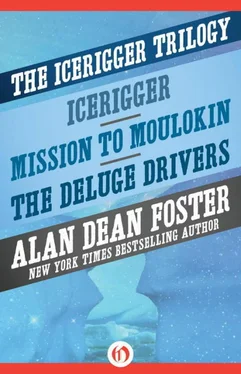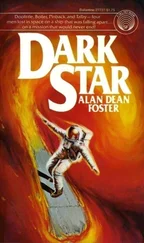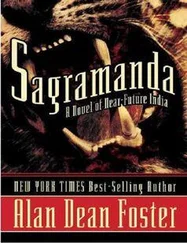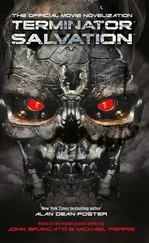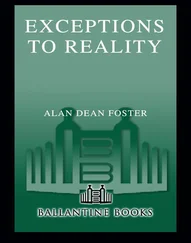Ethan reflected that while Polos insisted he belonged to a simple working people, they were more than sophisticated enough to have evolved an inflexible, efficient procedure for dealing with potentially bellicose strangers. He didn’t doubt the diplomat’s claim that his people were no strangers to killing. Mirmib had likely overseen this turning in of weapons many times in the past.
As steel and bone rattled unmelodiously on the ever-mounting heap, Hunnar moved to stand next to Ethan and whisper. “Your proposed confederation and your own life may end with your blood steaming on the streets of this city, Sir Ethan.”
“Even in my business, you eventually reach a point where you have to trust someone, Hunnar.”
“You speak highly of trust, Sir Ethan,” Hunnar said wryly, “yet I notice that neither you nor your companions have stepped forward to place your weapons of light on the pile before us.”
“As long as this fellow doesn’t recognize them as weapons, there’s no need to overextend ourselves where we don’t have to.” Ethan’s rationalization sounded unwieldy as he muttered it. “In my business, it’s also a good idea to have an ace in the hole.”
“Would that we had a hundred such aces,” Hunnar agreed, expanding on the analogy without understanding it. “’Tis interesting to note that you do not regard trust as an absolute, but as a term with definitions which vary according to the situation.”
“I didn’t mean—” Ethan started to argue. But Hunnar, trying hard to conceal his evident pleasure at this revelation of human morality, walked away before the salesman could reply.
Polos Mirmib studied the imposing heap of weapons as the last sword was laid atop the metal and bone pile. Edges and points gleamed in the dim canyon light.
“For those who profess to offer naught but friendship, you travel well-armed.”
Elfa offered a candid response. “We also have much to kill for.”
“Well put, my lady.” Mirmib executed a light gesture of modest admiration.
“What now?” September’s impatience made him sound nervous, which he wasn’t. “We just push the lot over the side? Or do you have somebody waitin’ to come pick them up and tag them for us?”
“Neither.” Mirmib showed the giant his widest non-tooth smile. “Your willingness to so comply with a custom of gravest imposition is sufficient proof of your good faith and, I hope, true intentions,” He gestured idly at the armory. “You may repossess your weaponry. Your actions have told us what we wished to know.” While those of the crew standing around stared stupefied at the diplomat, he turned and walked to the railing. A mild gust of Tran-ky-ky’s unceasing, arctic winds made him stumble and Ethan reflected again on the other’s fragility. Like many sentients of great character, Mirmib wore his steel and iron inside.
He shouted to the two Tran waiting on the tiny raft alongside. Ethan caught only isolated scraps of sentences. The accent used here was thick and slippery.
One of the Tran blew several indelicate notes on a horn. This mournful baying was answered by a jubilant blare from a horn on the first wall. Another horn sounding from the second wall, up ahead, was followed by several more, until the canyon reverberated like a thranx concert at mating jubileejee.
When the final mellow flat had retreated into crevices too small to return it with audible force, Ethan was able to make out cheers from the Moulokinese soldiers lining the massive walls ahead and behind. The small raft moved away from the Slanderscree ’s shadow to assume a waiting position near her bow.
“Where is your captain?” Mirmib asked. Sliding his own sword back into its sheath, Hunnar used his free hand to point to the high helm deck. Ta-hoding stood staring curiously down at them. “I will join him, to aid in directing you to our city.”
Ethan joined several others in following Hunnar and Mirmib up to the wheel. While Ta-hoding received instructions and conferred with Mirmib, Hunnar drew Ethan aside.
“See, the cables barring the gates fore and aft have been taken in. We could break the gate behind us and escape.”
Ethan eyed his massive, hirsute friend. “Is that what you wish to do?”
“I do not. You accuse with your questioning, friend Ethan.” It was Hunnar’s turn to walk away for a different reason.
Ta-hoding had the necessary sails reset. Slowly the icerigger moved toward the second gate, swinging delicately through the tight bend in the canyon. As they squeaked through the gate, the soldiers on the walls studied the ship and its occupants intently. Unlike the Slanderscree ’s passage through the first gate, however, the watching warriors jostled one another and chattered freely among themselves. Their weapons hung easily from paws or lay forgotten against walls and rocks. A few even exchanged hesitant questions with members of the icerigger’s crew.
The canyon grew no shallower as they followed Mirmib’s raft up the ice. Sheer basalt walls towered steadily higher above them. Before long the canyon wound around to the east and started inland again. The walls hemming them in seemed to lower slightly, and breaks where a man might climb upward began to appear in the hitherto vertical cliffs.
Now that they were facing the interior of the plateau once more, Ethan could see over the bow the dense clouds they’d found so intriguing from out on the ice ocean. They continued to hover persistently in one place, succumbing to the dispersing effect of the wind only with reluctance. Their initial familiarity now came home to him.
Similar clouds clung possessively to the plutonic highlands of Sofold, Hunnar and Elfa’s home island. That puissant grayness was a great upwelling of steam, not smoke. Issuing forcefully from volcanic fissures and vents, it would renew itself as fast as it could be blown away. That explained the illusion of the “hovering” clouds.
Volcanic heat provided the base for Sofold’s foundry and much of its wealth. So in addition to a reputation for fine shipbuilding and an impregnable canyon locale, Moulokin also enjoyed this additional important resource.
He moved to stand next to the diplomat Mirmib. “’Tis true there are foundries up there,” the emaciated Tran admitted, “but they are neither owned nor operated by us.” In response to Ethan’s look of surprise and consternation, he explained, “We have an agreement with the people who operate the foundries.”
“They’re not Moulokinese?”
“No.” And he formed a peculiar expression Ethan could not interpret.
He intended to pursue the question, except the Slanderscree abruptly turned hard to starboard. They were proceeding up a side canyon. Sailors fought with spars and sails, but for a new reason. Now that the icerigger was traveling southward and no longer heading inland, the wind from the plateau all but vanished as soon as the ship had fully entered the branch can yon.
The wind faded to a gentle, almost earthlike breeze. Tentatively Ethan cracked the mask of his survival suit, hastily shut it again. There was no paradise ahead. The wind might have died, but if it was warmer than minus fifteen outside his protective clothing, the outraged cells on his face had lied to him. Moulokin would be no Trannish Shangri-la.
The canyon took several twists and turns. Ten minutes later it opened into a vast natural amphitheater. The dark cliffs arced out to east and west before curving smoothly southward again. They were moving across a cliff-walled bowl at least a dozen times wider than the mouth of the canyon.
Ahead lay Moulokin, looking very real.
At the southern end of the canyon the cliffs had crumbled and eroded away, mounting upward in uncertain stages, forming levels. Much of the city was constructed on these levels, giving Moulokin a terraced look.
Читать дальше
